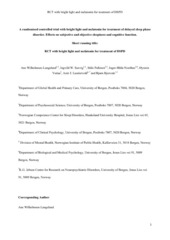A randomized controlled trial with bright light and melatonin for treatment of delayed sleep phase disorder. Effects on subjective and objective sleepiness and cognitive function.
Wilhelmsen-Langeland, Ane; Saxvig, Ingvild West; Pallesen, Ståle; Nordhus, Inger Hilde; Vedaa, Øystein; Lundervold, Astri Johansen; Bjorvatn, Bjørn
Peer reviewed, Journal article
Accepted version
Permanent lenke
https://hdl.handle.net/1956/7648Utgivelsesdato
2013-10Metadata
Vis full innførselSamlinger
Sammendrag
Delayed sleep phase disorder (DSPD) is a circadian rhythm sleep disorder. Patients with DSPD have problems initiating sleep if they go to bed at a conventional time and they often have problems waking at desired times. If they rise early in the morning they usually experience severe sleepiness during morning hours. In the present study we investigated short- and long term effects on measures of subjective and objective sleepiness and cognitive function of bright light and melatonin treatment alongside gradually advanced rise times in adolescents and young adults. Four treatment conditions were used in the shortterm intervention (two weeks); dim light (placebo) + placebo capsule, bright light + placebo capsule, dim light (placebo) + melatonin capsule and bright light + melatonin capsule. This was followed by a longterm intervention (three months) including two conditions; no treatment and combined bright light + melatonin treatment. Effects of treatment on sleepiness and fatigue were the primary outcome measures and effects on cognitive function were secondary outcome measures. On a gradual advancement of rise time schedule, all treatment conditions (bright light, melatonin, the combination and placebo) were almost equally effective in improving subjective daytime sleepiness, fatigue and cognitive function in the twoweek study. The two-week intervention showed no effect on objective sleepiness. Long-term treatment increased some of the positive effects seen after two weeks. Combined bright light and melatonin treatment improved subjective daytime sleepiness, fatigue and cognitive function in the three-month study. The no-treatment group returned to baseline values on most variables. In conclusion, gradual advancement of rise times seems to produce positive effects on subjective sleepiness, fatigue and cognitive performance during short-term treatment of patients with DSPD. However, the benefits from gradually advanced rise times seem to wear off, suggesting that continuation of bright light and melatonin treatment is beneficial to maintain positive effects over time.
